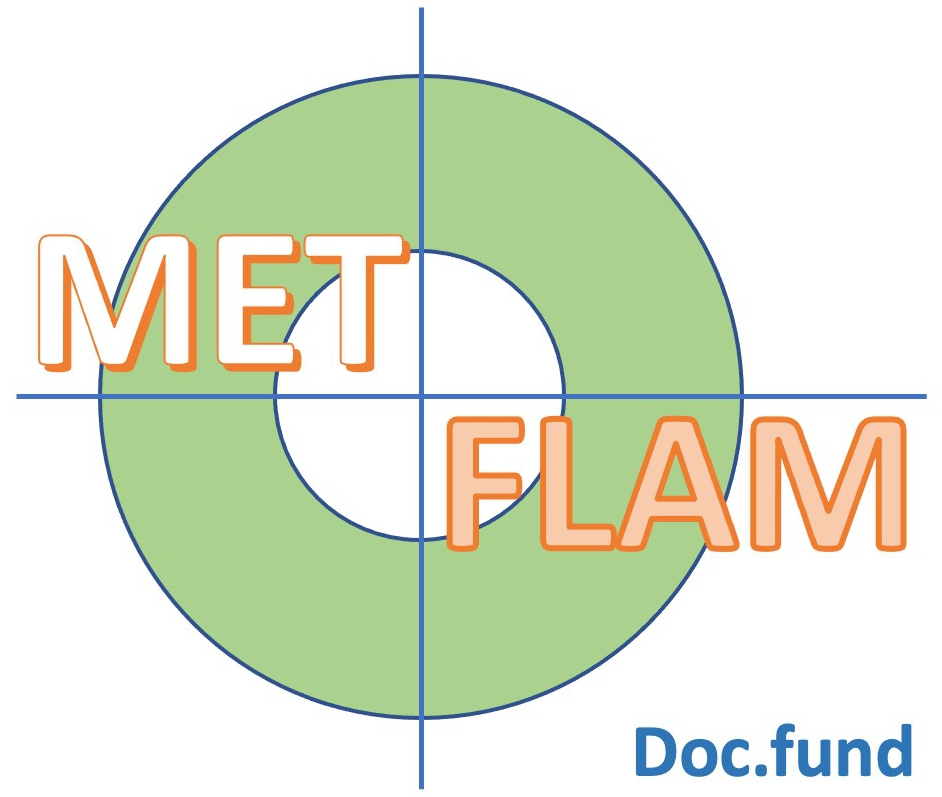


The Doctoral Programme
“Metabolism in Immune Responses and Inflammation”
(MET-FLAM)
Aims / Objectives
The goal of MET-FLAM is to provide excellent multidisciplinary graduate training. The program focuses on metabolism and immunomodulatory mechanisms, as both are highly relevant for medical research and patient care. Inflammatory diseases affect several hundred million people and are among the most important diseases in terms of incidence, prevalence, and socio-economic burden. The same is true for metabolic diseases and obesity. In the last two decades, strong efforts have been made to link these two topics and to understand how metabolic derangements, immune function, and inflammation are interrelated, coining the term ‘immunometabolism’. In a narrow sense, immunometabolism deals with metabolic processes and changes within immune cells as part of their functions and regulators of their responsiveness [1] and how they might be exploited therapeutically [2]. More broadly, systemic metabolic alterations might also impact immune responses, highlighting the link between metabolic diseases on the one hand and inflammatory and autoimmune diseases on the
 The immune system can be considered a double-edged sword: In a physiological context, inflammatory processes serve to defend against pathogens
and to heal and regenerate the tissue [6]. Under pathological conditions, inflammation may turn against the host and
cause extensive tissue damage and promote disease progression, leading to cellular dysfunction, chronic disease, or even
cancer [7]. Current treatment strategies help to control symptoms and improve the quality of life, but do not cure
the underlying disease. Thus, MET-FLAM focuses on deciphering the interplay between the immune system / inflammatory
cells and structural components. By studying the metabolic changes underlying inflammation and the metabolic responses to
it — recently termed ‘metaflammation’ —, MET-FLAM aims to develop new diagnostic and
therapeutic concepts. The inherent diversity of approaches and methodologies will provide students with a deep knowledge of the major areas
of inflammation, which go far beyond their individual projects. To reflect the complexity of inflammatory diseases we propose here
17 projects that can be assigned to one or two of four main areas: Area 1: Autoimmunity and allergy,
Area 2: Cardiovascular and lung diseases, Area 3: Gastrointestinal diseases and placenta, and
Area 4: Brain and mental disorders.
The immune system can be considered a double-edged sword: In a physiological context, inflammatory processes serve to defend against pathogens
and to heal and regenerate the tissue [6]. Under pathological conditions, inflammation may turn against the host and
cause extensive tissue damage and promote disease progression, leading to cellular dysfunction, chronic disease, or even
cancer [7]. Current treatment strategies help to control symptoms and improve the quality of life, but do not cure
the underlying disease. Thus, MET-FLAM focuses on deciphering the interplay between the immune system / inflammatory
cells and structural components. By studying the metabolic changes underlying inflammation and the metabolic responses to
it — recently termed ‘metaflammation’ —, MET-FLAM aims to develop new diagnostic and
therapeutic concepts. The inherent diversity of approaches and methodologies will provide students with a deep knowledge of the major areas
of inflammation, which go far beyond their individual projects. To reflect the complexity of inflammatory diseases we propose here
17 projects that can be assigned to one or two of four main areas: Area 1: Autoimmunity and allergy,
Area 2: Cardiovascular and lung diseases, Area 3: Gastrointestinal diseases and placenta, and
Area 4: Brain and mental disorders.
References:
- O'Neill LA, Kishton RJ, Rathmell J: A guide to immunometabolism for immunologists. Nat Rev Immunol, 2016; 16(9):553–565. doi:10.1038/nri.2016.70
- Pålsson-McDermott EM, O'Neill LAJ: Targeting immunometabolism as an anti-inflammatory strategy. Cell Res, 2020; 30(4):300–314. doi:10.1038/s41422-020-0291-z
- Lercher A, Baazim H, Bergthaler A: Systemic Immunometabolism: Challenges and opportunities. Immunity, 2020; 53(3):496–509. doi:10.1016/j.immuni.2020.08.012
- Christ A, Lauterbach M, Latz E: Western Diet and the Immune System: An Inflammatory Connection. Immunity, 2019; 51(5):794–811. doi:10.1016/j.immuni.2019.09.020
- Saltiel AR, Olefsky JM: Inflammatory mechanisms linking obesity and metabolic disease. J Clin Invest, 2017; 127(1):1–4. doi:10.1172/JCI92035
- Schett G, Neurath MF: Resolution of chronic inflammatory disease: universal and tissue-specific concepts. Nat Commun, 2018; 9(1):3261. doi:10.1038/s41467-018-05800-6
- Gomes M, Teixeira AL, Coelho A, Araújo A, Medeiros R: The role of inflammation in lung cancer. Adv Exp Med Biol, 2014; 816:1–23. doi:10.1007/978-3-0348-0837-8_1